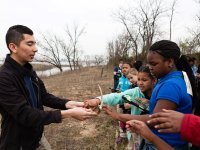6 Tips for Engaging Capstone Projects
Rather than creating a year-in-review capstone project, consider having students synthesize and personalize what they’ve learned, bringing it to a new level.
Your content has been saved!
Go to My Saved Content.It’s that time of the year, the race to the finish, only weeks until school ends for the summer (at least for many of us). With the pressures of testing behind us, we often have a bit more freedom to create curriculum and activities for students. We can try out new ideas, give students more choice in what they want to learn, and celebrate the learning that we've accomplished this year. One way that many educators like to do these things is through capstone projects, year-end culminations that often invite students to engage in choosing what they want to learn, as well as how they learn it. Capstone projects are a great tool for personalizing learning, and they're effective for creating even more student engagement. Here are some tips to create excellent capstone projects.
Ensure "Main Course, Not Dessert"
This is always a good reminder. While capstone projects often draw on the entire year's learning, it's important to pose this question to students as well as reflecting upon it ourselves as educators: What new learning will occur in this capstone project? This is key to ensuring that a capstone project isn't simply a fun activity (although that's still a good intention), and it helps in creating a project that's more challenging and truly focused on new learning and experiences. This new learning could be in a different context or topic from what the class has done so far, it might require a variety of skills that they haven't previously combined, or it could be a synthesis of sorts. Reflect on how you can ensure that there will be new learning in your capstone projects.
Take It To Another Level
Projects should focus on depth, not breadth. If you have the ability to allow students choice in what they learn, consider having them revisit a previously learned concept, topic, or skill. To ensure not only engagement but also "Main Course," create rubrics with students that focus on their going deeper into the content. Instead of "meeting standard," focus the assessment and learning on "exceeding standard." When students engage with a challenge, we should take them beyond the opportunity to review learning by pushing the learning even farther in a capstone project.
More Voice and Choice
This is nothing new, but we can always think of new ways to offer choice to our students. At the end of the year, after we've pressed through most of our required curriculum and standards, we may have some wiggle room on what students can learn. We might offer choice in one way, but not in another. Perhaps we want to spiral review a writing skill for all students, but offer them a choice in what history topic they want to learn about. Or we might need students to learn a math concept that we haven't yet covered in the curriculum, but they can choose how they want to learn it and connect that concept to the real world. Have students make personal, meaningful choices. See my previous blog about voice and choice for ideas about how to create more engagement.
Make a Difference
One of my favorite ways of taking capstone projects to another level is through service and making a difference. When students see that their work matters, they will be engaged. There are, of course, lots of opportunities to make an impact outside of the walls of the classroom, whether in the community or globally. There are also great ways for students to make a difference in their own lives once they understand the personal impact that's possible. Start by asking then how they want to make a difference in their capstone projects.
Tell the Full Story Through Assessment
Often, capstone projects involve what could be called a portfolio of student learning, which includes many steps in their yearlong journey. These assessments, graded or not, are valuable artifacts that serve as a photo album of a learning continuum, rather than simple snapshots representing individual moments of learning. Capstone projects are about growth, and both teachers and students can use assessments from the capstone project as well as earlier in the year to celebrate the growth in learning. Students, parents, and teachers deserve to see this growth in order to be proud of their learning from the entire year as well as during the capstone project.
Experiment With "No Grades"
Often we use grades as a way to get students to learn rather than addressing a root problem -- our students are not engaged. While you might want to grade students on their work, you might also try the experiment of moving students away from grades as a motivator, and instead focus on the learning. Rather grading every part of the capstone project, consider grading only the capstone component. This is also in ideal place to start the conversation with students about how they want to be and should be graded. Consider using capstone projects to start a culture shift away from grades and toward learning.
I love implementing and watching students implement capstone projects. I'm inspired by the ways that teachers structure these projects and by the amazing learning that students share. Capstone projects are truly an opportunity to create meaningful learning along with powerful engagement and impact. How do you create engaging capstone projects?
